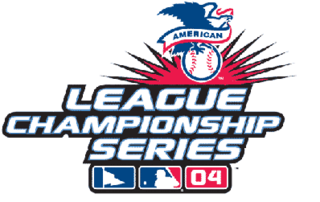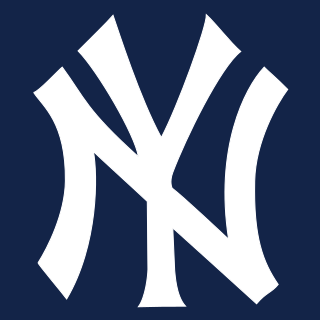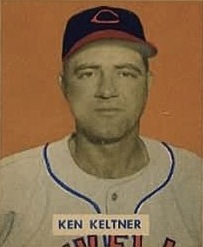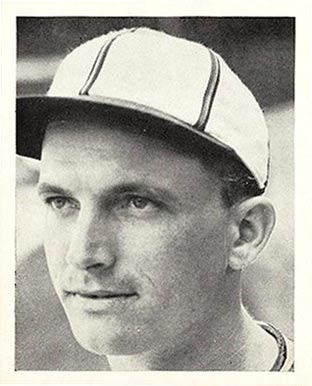
The Curse of the Bambino was a superstitious sports curse in Major League Baseball (MLB) derived from the 86-year championship drought of the Boston Red Sox between 1918 and 2004. The superstition was named after Babe Ruth, colloquially known as "The Bambino", who played for the Red Sox until he was sold to the New York Yankees in 1920. While some fans took the curse seriously, most used the expression in a tongue-in-cheek manner.

The 2003 American League Championship Series (ALCS) was played between the Boston Red Sox and the New York Yankees from October 8 to 16, 2003. The Yankees won the series four games to three to advance to the World Series, where they lost in six games to the National League champion Florida Marlins.

Victor John Angelo Raschi was an American Major League Baseball pitcher. Nicknamed "the Springfield Rifle", he was one of the top pitchers for the New York Yankees in the late 1940s and early 1950s, forming the "Big Three" of the Yankees' pitching staff. He also pitched for the St. Louis Cardinals and the Kansas City Athletics.

Robert Granville Lemon was an American right-handed pitcher and manager in Major League Baseball (MLB). Lemon was elected to the National Baseball Hall of Fame in 1976.

Stephen Francis O'Neill was an American professional baseball catcher and manager. He played his first 13 seasons with the Cleveland Indians. As a manager, he led the 1945 Detroit Tigers to a World Series championship.

The 2004 American League Championship Series was the Major League Baseball playoff series deciding the 2004 season American League champion earning the privilege to play in the 2004 World Series. A rematch of the 2003 American League Championship Series, it was played between the Boston Red Sox, who had won the AL wild card and defeated the Anaheim Angels in the American League Division Series, and the New York Yankees, who had won the AL East with the best record in the AL and defeated the Minnesota Twins. The Red Sox became the first team in MLB history to come back from a 3–0 series deficit to win a best-of-seven series. Prior to the 2004 ALCS, no MLB team had so much as forced a Game 7 under those circumstances – and only one team since 2004 has been able to do so.

The Yankees–Red Sox rivalry is a Major League Baseball (MLB) rivalry between the New York Yankees and the Boston Red Sox. Both teams have competed in MLB's American League (AL) for over 120 seasons and have since developed what is arguably the fiercest rivalry in all of American sports. In 1919, Red Sox owner Harry Frazee sold star player Babe Ruth to the Yankees, which was followed by an 86-year period in which the Red Sox did not win a World Series. This led to the popularization of a superstition known as the "Curse of the Bambino," which was one of the most well-known aspects of the rivalry.
The 1948 World Series was the championship series in Major League Baseball for the 1948 season. The 45th edition of the World Series, it matched the American League (AL) champion Cleveland Indians and the National League (NL) champion Boston Braves. The Braves had won the National League pennant for the first time since the "Miracle Braves" team of 1914, while the Indians had spoiled a chance for the only all-Boston World Series by winning a one-game playoff against the Boston Red Sox for the American League flag. Though superstar pitcher Bob Feller failed to win either of his two starts, the Indians won the Series in six games to capture their second championship and their first since 1920.

Kenneth Frederick Keltner was an American professional baseball player. He played in Major League Baseball as a third baseman from 1937 to 1950, most prominently as a member of the Cleveland Indians where he was a seven-time All-Star player and was a member of the 1948 World Series winning team. He played his final season for the Boston Red Sox.

Benjamin Edwin Paschal was an American baseball outfielder who played eight seasons in Major League Baseball from 1915 to 1929, mostly for the New York Yankees. After two "cup of coffee" stints with the Cleveland Indians in 1915 and the Boston Red Sox in 1920, Paschal spent most of his career as the fourth outfielder and right-handed pinch hitter of the Yankees' Murderers' Row championship teams of the late 1920s. Paschal is best known for hitting .360 in the 1925 season while standing in for Babe Ruth, who missed the first 40 games with a stomach ailment.

James Edward Hegan was an American professional baseball player, coach, and scout. He played for 17 seasons as a catcher in Major League Baseball (MLB) from 1941 to 1942 and 1946 to 1960, most notably for the Cleveland Indians with whom he won a World Series in 1948.

Robert Cleveland Muncrief was an American professional baseball pitcher who appeared in 288 games in Major League Baseball over 12 seasons between 1937 and 1951 with the St. Louis Browns, Cleveland Indians, Pittsburgh Pirates, Chicago Cubs and New York Yankees. Born in Madill, Oklahoma, he batted and threw right-handed and was listed as 6 feet 2 inches (1.88 m) tall and 190 pounds (86 kg). He is perhaps best known as a key starting pitcher for the 1944 Browns, the only American League team from St. Louis to win a pennant. The following season, in 1945, Muncrief led all Junior Circuit hurlers in winning percentage, posting a .765 mark based on his 13–4 record.
The 1949 New York Yankees season was the team's 47th season. The team finished with a record of 97–57, winning their 16th pennant, finishing 1 game ahead of the Boston Red Sox. New York was managed by Casey Stengel in his first year. The Yankees played their home games at Yankee Stadium. In the World Series, they defeated the Brooklyn Dodgers in 5 games.
The 1948 Boston Red Sox season was the 48th season in the franchise's Major League Baseball history. After 154 regular-season games, the Red Sox and Cleveland Indians finished atop the American League with identical records of 96 wins and 58 losses. The teams then played a tie-breaker game, which was won by Cleveland, 8–3. Thus, the Red Sox finished their season with a record of 96 wins and 59 losses, one game behind Cleveland.
The 1949 Boston Red Sox season was the 49th season in the franchise's Major League Baseball history. The Red Sox finished second in the American League (AL) with a record of 96 wins and 58 losses, one game behind the New York Yankees, who went on to win the 1949 World Series.
The 1948 Cleveland Indians season was the 48th in franchise history. When the regular season resulted in a first place tie, the Indians won a one-game playoff against the Boston Red Sox to advance to the World Series. Cleveland won the championship by defeating the Boston Braves 4 games to 2 for their first World Series win in 28 years. The Sporting News ranked the 1948 Indians the ninth-best team ever.
The 1949 Major League Baseball season was contested from April 18 through October 15, 1949. Both the American League (AL) and National League (NL) had eight teams, with each team playing a 154-game schedule. The New York Yankees won the World Series over the Brooklyn Dodgers in five games. Ted Williams of the Boston Red Sox and Jackie Robinson of the Dodgers won the Most Valuable Player Award in the AL and NL, respectively.

The 2009 New York Yankees season was the 107th season for the New York Yankees franchise. The Yankees opened their new Yankee Stadium on April 3, 2009, when they hosted an exhibition game against the Chicago Cubs. The new stadium hosted its first regular season game on April 16, when the team played against the Cleveland Indians and their first playoff game against the Minnesota Twins in the ALDS on October 7, 2009. The Yankees swept the Twins in three games to win the divisional series. They won their 40th American League pennant on October 25, defeating the Los Angeles Angels of Anaheim in 6 games to advance to the World Series, where they defeated the defending World Series champion Philadelphia Phillies in six games to win their 27th World Series title on November 4. The Yankees finished the regular season with 103 wins and 59 losses.

The 1978 American League East tie-breaker game was a one-game extension to Major League Baseball's (MLB) 1978 regular season. The game was played at Fenway Park in Boston on the afternoon of Monday, October 2 between the rival New York Yankees and Boston Red Sox to determine the winner of the American League's (AL) East Division.

Henry Eugene Bearden was an American professional baseball pitcher, a left-hander who played in Major League Baseball (MLB) from 1947 to 1953 for the Cleveland Indians, Washington Senators, Detroit Tigers, St. Louis Browns and Chicago White Sox. In 193 career games, Bearden pitched 7881⁄3 innings and posted a win–loss record of 45–38, with 29 complete games, seven shutouts, 259 strikeouts, and a 3.96 earned run average (ERA).


















